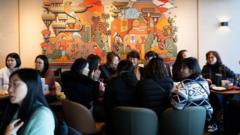Why Is Starbucks Korea Going Printerless and PC-Free?

Published: 2025-08-12 16:30:20 | Category: technology
Starbucks' New Policy on Bulky Items: A Response to Changing Cafe Culture in South Korea
In recent times, South Korea has witnessed a significant cultural shift in how people work, particularly in cafes. Starbucks, a global leader in the coffee industry, has recently issued a directive concerning the presence of bulky items in its stores. This move comes in response to an increasing number of customers using the cafes as makeshift offices, bringing in not just laptops, but also printers, desktop computers, and even partitions. This article delves into the implications of this policy change, exploring the balance between providing a comfortable space for coffee lovers and accommodating remote workers.
The Rise of Cagongjok: The Cafe-Office Phenomenon
The term "cagongjok" has emerged in South Korea, referencing the trend of people working in cafes. Initially embraced as a flexible working solution, it has sparked intense debate among patrons and business owners alike. While many individuals appreciate the ambiance of cafes for productivity, others argue that this has led to overcrowding and limited access to seating for those who simply want to enjoy a cup of coffee.
Starbucks' Response: A Balance Between Comfort and Productivity
In light of the growing concerns about the use of cafes as office spaces, Starbucks has taken a firm stance. The company announced that while personal devices such as laptops and mobile phones remain welcome, bulky items that could impede the shared experience should be left at home. This policy aims to ensure that all customers can enjoy the ambiance of the cafe without feeling crowded or restricted.
The Community Reaction: Mixed Feelings
The announcement has ignited a wave of reactions on social media, with many expressing support for the new policy. Some users applauded Starbucks for taking a stand against what they perceive as an encroachment on public space. Comments such as "Good job" highlight a shared sentiment that other cafes should adopt similar measures. Conversely, there are those who feel that the policy may unfairly penalize remote workers who genuinely seek a productive environment.
The Bigger Picture: Global Trends in Cafe Culture
Starbucks' move is reflective of a broader trend seen in cafes worldwide, where the line between casual coffee shop and workplace is increasingly blurred. Similar policies have emerged in various countries, particularly in England, where coffee shops are implementing measures to prevent remote workers from monopolizing tables. These changes signify a growing recognition of the need for balance in shared spaces.
Understanding the Implications of Starbucks' New Policy
As Starbucks navigates this complex landscape, several implications arise from its new policy. This section will explore the potential effects on customers, the company, and the overall cafe culture in South Korea.
Impact on Customers
The new policy could lead to a more pleasant experience for customers looking for a casual place to unwind. By limiting the number of bulky items in cafes, Starbucks aims to create an environment that prioritizes comfort and accessibility. Regular patrons may find it easier to find a seat, reducing the frustration often felt when cafes are overrun by those using the space for extended work sessions.
Impact on Starbucks as a Brand
Starbucks has long positioned itself as a "third place" – a space between home and work. The introduction of this policy could enhance its brand image as a community-focused establishment that listens to the needs of its clientele. By addressing the concerns of patrons who feel uncomfortable in overcrowded cafes, Starbucks reinforces its commitment to providing a welcoming atmosphere for all.
Impact on Cafe Culture in South Korea
This policy may set a precedent for other cafes in South Korea, compelling them to reassess their own approach to accommodating remote workers. As more establishments reconsider their seating policies, the cafe culture may shift towards a model that balances the needs of casual customers with those of remote workers. This could lead to a more harmonious coexistence between the two groups.
Creating a Positive Cafe Experience: Best Practices for Customers
For those who enjoy working in cafes, understanding the nuances of this new policy can help foster a positive experience for everyone involved. Here are some best practices to consider:
- Limit Your Equipment: Opt for smaller devices like laptops and tablets instead of bulky items that occupy excessive space.
- Be Mindful of Time: If you're working for an extended period, consider purchasing additional items to support the establishment.
- Share the Space: Be aware of peak hours and try to use cafes during less busy times to avoid monopolizing tables.
- Respect Other Patrons: Ensure that your work setup does not encroach on others' space or comfort.
The Future of Working in Cafes
The landscape of remote work is evolving, and cafes are adapting to meet these changes. As Starbucks enforces its new policy, it will be interesting to observe how other establishments respond and how this affects customer behavior. Will we see a decline in the "cagongjok" phenomenon, or will it simply adapt to new norms?
Frequently Asked Questions
What is the new policy at Starbucks in South Korea?
Starbucks in South Korea has implemented a policy restricting customers from bringing bulky items like desktop computers and printers into cafes. Laptops and smaller devices are still allowed to maintain a comfortable shared space for all patrons.
Why has Starbucks introduced this policy?
The policy aims to create a more pleasant and accessible environment for all customers, addressing concerns about overcrowding and the use of cafes as extended office spaces.
How are customers reacting to the new policy?
Reactions have been mixed, with many customers expressing support for the policy, while others feel it may unfairly impact those who prefer to work in cafes.
What are some best practices for working in cafes?
Best practices include limiting equipment, being mindful of time spent in the cafe, sharing space with others, and respecting the comfort of fellow patrons.
Conclusion: The Evolving Cafe Landscape
Starbucks' new policy in South Korea reflects a growing trend of balancing the needs of casual customers with those of remote workers. As cafes navigate this evolving landscape, it is crucial for all patrons to be mindful of their impact on shared spaces. The future of cafe culture may depend on our collective ability to adapt and find harmony in how we use these beloved establishments.
As remote work becomes more prevalent, what do you think the future holds for cafes as workspaces? How can we ensure that these spaces remain welcoming for everyone? #CafeCulture #RemoteWork #StarbucksPolicy



